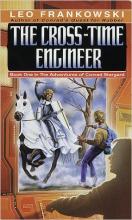Leo Frankowski: The Cross-Time Engineer

In middle school, I was on an airplane back home from somewhere (probably visiting relatives in Colorado or Pennsylvania). I finished my book on the first flight and didn't have anything else to read, so the person sitting next to me on the plane gave me a book he had finished to read. That book was The Radiant Warrior, the third book in the Conrad Stargard series by Leo Frankowski. I enjoyed it, but I didn't think very critically about it, and since this was before e-commerce was big, I couldn't just press a button and read the other books in the series at a moment's notice, so I had only read that one book. I recently decided to actually read the series to see how it was with fresh eyes.
The premise: Conrad, a 20-something, MIT-educated, Polish engineer, gets sent back in time to 13th century Poland 10 years before the Mongols invade. He has to use his engineering knowledge to bring about an industrial and military revolution in Poland in time to beat the invasion.
The books do a reasonable job of executing on this premise. There is an interesting exploration of how industrialization happens and what it means. It touches on social hierarchies, economy systems, the role of religion, war, intercultural dialogue, and probably some other stuff. The first few books are written in an engaging manner.
The first 4 books are similar to one another, and they wrap up the premise described above. The epilogue of the fourth book even seems to be written to conclude everything, and it doesn't leave much room for other books in the same universe. Then, Leo Frankowski decided to write 5 more books in the same universe. These books don't have the same focus as the first four. Eg, many focus on minor characters, and there isn't much attention paid to the engineering and societal changes that made the first four books interesting.
Even with the first few books, I had some problems.
The most pronounced problem with the books is that they're really sexist. On his website, he writes, "Feminists, Liberals, and Homosexuals, seem to instinctively hate my guts. I don't know why," though that comment is shortly followed by, "If you are a Feminist, with their desire for all the benefits and none of the responsibilities of citizenship; if you are a Liberal who thinks that productive people exist for the sole purpose of supporting non-productive people (and most especially Liberals)... Well then, you'd probably be a lot happier spending your money somewhere else" so it seems like he, perhaps, does know at least why liberals and feminists might not like his books. Or, at least, since he seems to viscerally hate certain groups, he shouldn't be surprised that he would come off poorly to people in those groups. Briefly, the books are sexist because Frankowski constructs a world with hollow female characters, uncritically presents a social structure where women are objectified (and where the protagonist objectifies them), and generally seems to disdain identity politics. He also constructs a rape culture, and he portrays that culture as good.
Frankowski also can't seem to write characters that are different from himself. He attempted to make the protagonist a Christian Socialist, but he doesn't end up seeming much of either except in name. Also, while the protagonist is supposedly Polish, he comes off as very American. Frankowski attempts to use the protagonist's time at MIT to justify all of this, but it's weird to have a character that lived in Poland for almost his entire life that barely even mentions his Polish identity or his time in Poland and repeatedly mentions a few years he spent in the US. Unsurprisingly, the author is Polish American but spent most of his life in the US. The secondary point of view characters are even less well constructed, and it shows in particular in any way that would seem to deviate from the overall womanizing engineer archetype.
The sloppy character development might be part of a larger problem of sloppy research. Even if the social dynamics were messed up, I would hope that a book that focuses on engineering innovations would at least get specific questions of fact correct. Nope. There were a few places where I read something that was presented as fact and thought, "that seems weird." So, I looked them up. And yeah, many of those instances seemed weird because they were just plain old myths with little to no factual basis that the author was just repeating and presenting as fact. I'm used to books that are focused on the social stuff rather than the science stuff, but even so, the authors do a ton of research and world building, so everything ends up very well put together and accurate (if fantastical). Frankowski seems to focus on the science and engineering to the exclusion of the social elements, but he doesn't even get his focus right.
I'm glad that I read the series because it showed me just how uncritical I was at a younger age. That said, I wouldn't recommend it to anyone.



